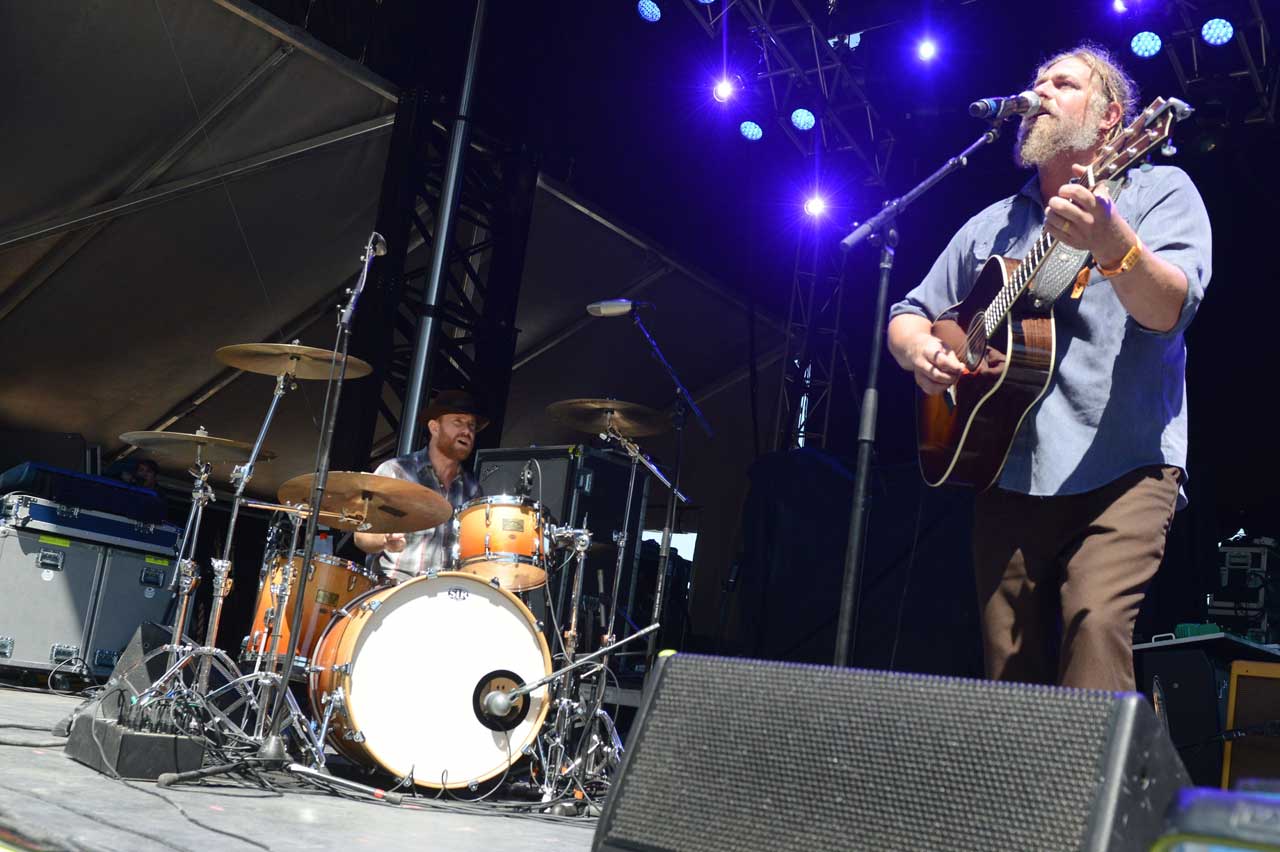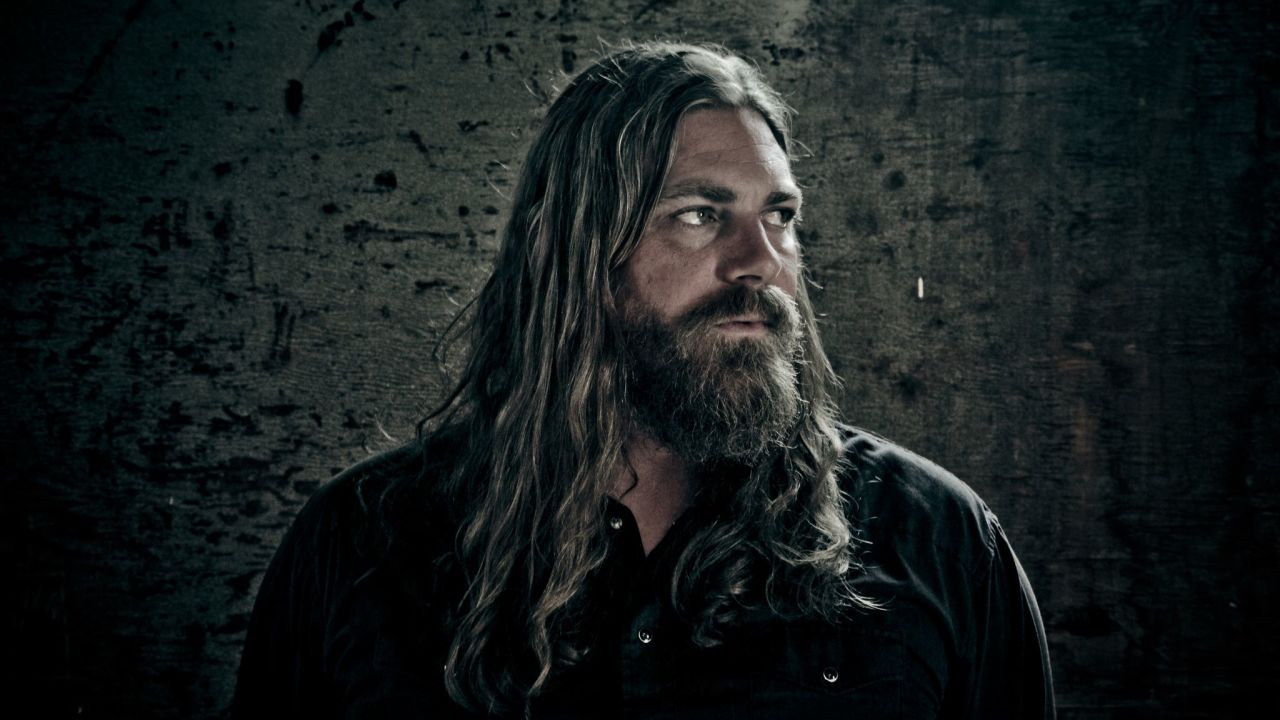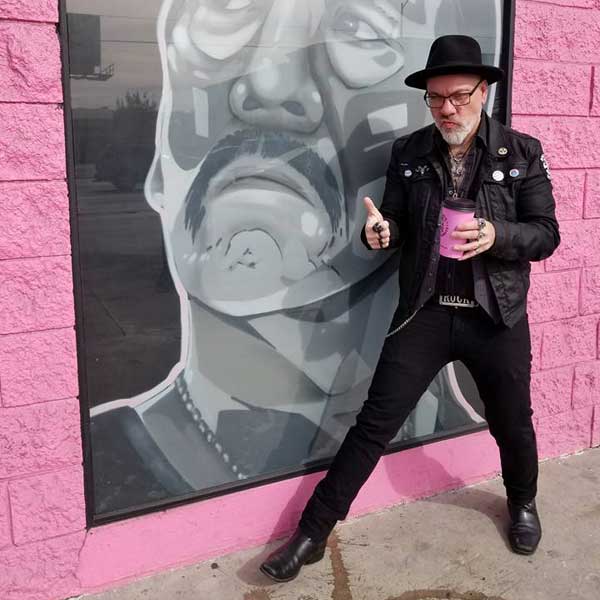The White Buffalo play Americana for the people who actually deserve it, the cops, soldiers, the hard-working and the broken-hearted. Since their 2002 debut, Hogtied Like a Rodeo, they’ve provided the soundtrack for the everyday glories of defeats of the working class, a kind of dark, rumbling, shaky blues and haunted roots-rock that cuts deep into bone and oozes with factory-floor authenticity.
The band came into prominence during the run of American cult biker-gang TV drama Sons of Anarchy, which featured a heaping fistful of the White Buffalo’s songs and made the band a household name in households hip enough to enjoy an hour full of leather vests, gnarly beards, belching motorbikes and hardcore violence every week. It was the perfect marriage of music and pop culture, and cemented the White Buffalo and their driving force, the very biker-friendly Jake Smith, as the hard-bit troubadours of a troubled age. And while darkness continues to define Smith’s work, there are cracks in the armour. The White Buffalo’s new album, Love And The Death Of Damnation — already out in the US, and coming to Europe in February — ends with what can only be called a gospel number, the jubilant, pop-soul charmer Come On Love Come On In, and rays of light zip throughout the rest of the album. Smith’s still not happy and neither is Love And The Death Of Damnation, but both clearly see redemption down the road somewhere.
Given the title of the new album, the baptismal cover photo of Smith in the water, and the line “My dark days are behind me” in the opener Dark Days, you might think that this album represents a rebirth of some sort. Not so, says the ever-stoic Smith.
“Well on this one I just wanted to get back to writing songs, as opposed to writing a concept album, which I did on the previous record, Shadows, Greys And Evil Ways. It’s not a rebirth, I was just trying to grow and to create new vibes both lyrically and musically, and to keep a couple of the songs more positive, just to keep with the theme of life and love. Not everything has to go down this dark, scary shithole. It often does, but it doesn’t have to.”
Hence Come On Love, a song that very nearly suggests Smith is ready to turn his back on the darkness that permeates his work.
“No,” he chuckles. “Definitely not. I mean, a couple people still get murdered on this album. I do think it’s the most varied album, but as far as my distancing myself from all that dark stuff, I think it’s hard for me to keep things super-positive. I just naturally gravitate to the shadowy edges of things. So it was something I consciously wanted to explore because I think it’s important to be reminded that everything isn’t always death, doom, and destruction.” There is, however, a thread of spirituality that runs through Love And Death, from the aforementioned closer to the ol’ time religious lament of Last Call To Heaven. But Smith reckons this is more about the songs than the singer.
“I’m not a very spiritual person at all,” he says. “I grew up kinda Athiest and I still don’t know what to believe. I believe that there might be something out there, but who knows? But I’ve always liked to play with those ideas of good and evil, heaven and hell, and it’s always a topic with pretty much every human in existence. Especially when you get a little older, you begin to ask questions like ‘Why?’ and What if?’ It’s one of those very human questions that will probably never be answered. I just think for you to think you know the answer is ridiculous.”
Spiritual or now, Smith’s music resonates deeply with a segment of society that’s often overlooked: the ever-shrinking working class. The White Buffalo’s music is thoroughly blue collar, the very definition of ragged glory.
“I think it resonates because it comes from an honest place,” he says “A lot of the songs are about hard work and I do have a lot of songs about war and about the military, even though I never served and there aren’t any people in my direct bloodline that have been soldiers. I just always found it fascinating. Pretty much the whole last album was about this guy’s life, this guy who went to war and came back all fucked-up and had to find the road back to redemption. The idea that you can fight in a war and then you have to come back and try to assimilate to civilian life again, that always fascinated me.”
Smith’s relatively humble background also shaped his man-of-the-street world view.
“My mom was a nurse and my dad was a college professor and I grew up in suburban southern California,” he explains. “My parents were working class people and I definitely grew up with that ethos, that you work hard and you try to provide.”

A family man who tries his best to balance a home life with time on the road, Smith finds himself at a crossroads with Love And The Death Of Redemption. With Sons Of Anarchy behind them, this is the first White Buffalo album in years not supported by high-profile media outlets. As Smith explains, the TV show did the band a tremendous favour, but they are now ready to carry on on their own.
“The show was great for us, especially on the side of touring and turning other people on to the music. It’s hard to judge sometimes, like was it this interview that sold more records? Was it the people coming out to the show? I mean, it can be a number of things, but definitely Sons of Anarchy had the most impact on my career and turned more people on. And I think the fact that there were so many songs on that show that were mine, I had like seven or eight, so I think eventually people thought, well this is cool, maybe I should dive deeper into this music. But apart from that, you still have to tour. You still have to bring your music to the people, and that’s what we’re concentrating on doing. I still go into markets where I won’t make money, but that’s how you build an audience. We do it in the most bare-bones way possible. We fly somewhere, rent a van, we backline all our gear, we don’t have any techs, we don’t have any roadies, we do it all ourselves.”
Of course, it still helps that he’s the guy that does the music for the biker show. “Yeah, luckily because of Sons Of Anarchy and some of the other TV and movie spots we’ve done, we can go out to a new town and enough people have heard my music for there to be at least a decent amount of people. It’s still challenging, but touring is effective. If you really want to play music, you’ve got to go out and bring it to the people.”
One other thing Smith might be bringing to the people soon: beer.
“I collaborated with Oskar Blue brewery and I created this White Buffalo brew that we did about a year and a half ago. It was more of a west coast style IPA and I’m talking to some other breweries right now. I’m a big beer drinker I love craft beers and I don’t really know much about them, I just kinda know what I like. But I’ve been part of the process, I’ve helped out. I’m talking with some breweries about a new one now. It’s just something fun that I like to do. I just tell them what I like and what I want to make. I’ll say I want to make an IPA that uses this particular type of hop and I want it to be clean and crisp and have this kind of colour or this kind of flavour, and we try to do it.”
Smith laughs. “I’m a beer nerd.”
I Got You, featuring Audra Mae, is released as a single on New Year’s Day. Love and the Death of Damnation will be released in Europe on Earache Records on February 12, and can be pre-ordered now.

